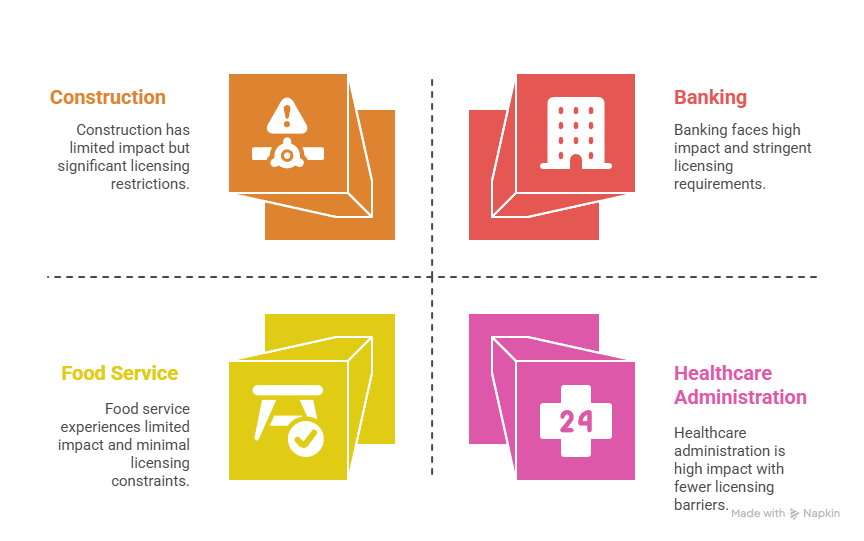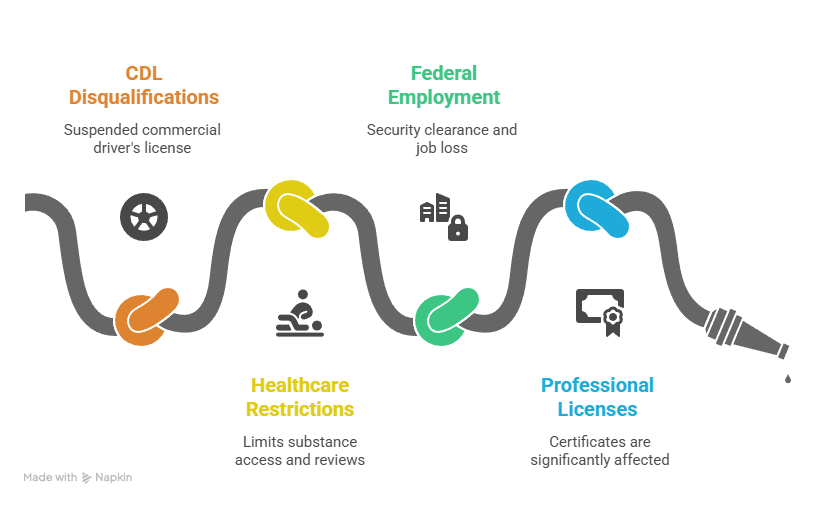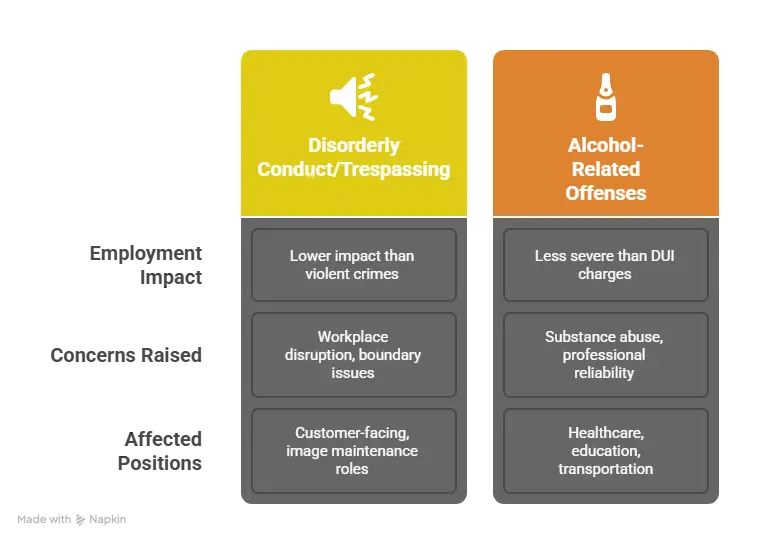Understanding misdemeanor conviction jobs and employment opportunities is crucial for both job seekers navigating background checks and employers making informed hiring decisions. While misdemeanor convictions carry less severe penalties than felonies, they can still significantly impact career opportunities depending on the specific offense type, industry requirements, and individual circumstances.
Key Takeaways
- Violent misdemeanors like assault and domestic violence have the highest employment impact across most industries, especially those involving customer contact or vulnerable populations
- Financial crimes including theft, fraud, and embezzlement create substantial barriers in banking, finance, retail, and positions handling money or sensitive information
- Drug-related offenses may disqualify candidates from healthcare, transportation, education, and federal employment due to licensing requirements and safety regulations
- Traffic violations beyond simple infractions, such as DUI or reckless driving, significantly affect driving-related positions and jobs requiring professional licenses
- Public order offenses like disorderly conduct generally have lower employment impact but may still influence hiring decisions in customer-facing roles
- Timing and rehabilitation efforts often matter more to employers than the specific offense type, with recent or repeat offenses carrying greater weight
Understanding Misdemeanor Classifications in Employment
Misdemeanors represent a middle tier of criminal offensesâmore serious than infractions but less severe than felonies. In employment screening, these offenses create complex considerations for both job seekers and hiring managers. The impact varies significantly based on the specific misdemeanor type, position requirements, and applicable regulations.
Most employers conduct background checks revealing misdemeanor convictions from the past seven to ten years. However, some states limit how far back employers can investigate. Understanding which misdemeanors carry the greatest employment consequences helps job seekers prepare for applications and enables employers to make fair, legally compliant hiring decisions.
Different industries maintain varying standards for misdemeanor acceptance based on job responsibilities, regulatory requirements, and risk management. Healthcare and education sectors typically have the strictest standards due to vulnerable population protection requirements and professional licensing oversight.
Violent Misdemeanors and Employment Impact
Violent misdemeanors represent one of the most challenging categories of criminal convictions when seeking employment, as they directly impact an employer's assessment of workplace safety and liability risks. Unlike property crimes or regulatory violations, violent offenses such as assault, battery, and domestic violence incidents create immediate concerns about an individual's ability to manage conflict, work cooperatively with colleagues, and interact safely with customers or clients.
The employment consequences extend far beyond obvious restrictions in security or law enforcement roles, affecting opportunities in healthcare, education, retail, hospitality, and even administrative positions where team collaboration is essential. Insurance companies often view employees with violent histories as higher liability risks, leading some employers to implement blanket exclusion policies despite legal guidelines encouraging individualized assessments. The stigma associated with violent behavior can persist longer than other types of misdemeanors, making rehabilitation demonstration and character references particularly crucial for job seekers in this category.
Assault and Battery Offenses
Simple assault, battery, and related violent misdemeanors create significant employment barriers across numerous industries. These offenses demonstrate potential workplace safety risks and raise concerns about customer interactions and team dynamics. Healthcare facilities and educational institutions typically exclude candidates with violent misdemeanor histories for positions involving patient or student contact.
Employers in retail and hospitality often view assault convictions as indicators of poor impulse control and inadequate conflict resolution skills. Even office-based positions may be affected if roles involve high-stress situations or collaborative team environments.
| Industry | Impact Level | Common Restrictions |
| Healthcare | High | Patient contact roles, licensing issues |
| Education | High | Student interaction, background clearances |
| Retail/Hospitality | Moderate-High | Customer-facing positions |
| Office/Administrative | Moderate | Team-based roles, client interaction |
Domestic Violence Related Charges
Domestic violence misdemeanors carry particularly severe employment consequences. The Lautenberg Amendment prohibits individuals with domestic violence convictions from possessing firearms, effectively eliminating law enforcement, military, and security career paths.
Professional licensing boards in healthcare, education, and social services scrutinize domestic violence convictions carefully, raising concerns about character, judgment, and ability to work safely with vulnerable populations.
Financial Crime Misdemeanors
Financial misdemeanors create substantial employment barriers in positions involving money handling, including theft, shoplifting, check fraud, and embezzlement charges. Banks and credit unions often maintain zero-tolerance policies for candidates with any financial crime history, regardless of amount or time elapsed.
Retail employers frequently exclude applicants with theft convictions, even for non-cashier positions, due to inventory shrinkage concerns. The employment impact extends beyond obvious money-handling roles to administrative positions with credit card access or expense account responsibilities.

- High-Impact Industries: Banking, finance, insurance, accounting, retail management, cashier positions
- Moderate-Impact Sectors: General retail, healthcare administration, government positions, office management
- Limited Impact Areas: Construction, manufacturing, food service (non-management), warehouse work
- Professional Licensing: CPA licenses, insurance licenses, real estate licenses, securities licenses face restrictions
Drug-Related Misdemeanor Offenses
Drug-related misdemeanor convictions create unique employment challenges that intersect with federal regulations, professional licensing requirements, and industry-specific safety protocols in ways that other criminal offenses typically do not. The complexity arises from the overlap between criminal justice consequences and regulatory compliance standards, particularly in sectors like healthcare, transportation, and federal contracting where drug-free workplace policies are mandated by law rather than employer preference.
These convictions often trigger automatic disqualifications from positions requiring security clearances, professional licenses, or access to controlled substances, regardless of the specific circumstances or time elapsed since the offense. The employment impact extends beyond initial hiring decisions to affect career advancement opportunities, professional development programs, and industry certifications that may be essential for long-term career growth. Additionally, drug-related misdemeanors can complicate international travel for business purposes and may affect eligibility for company-sponsored training programs or educational benefits, creating ripple effects throughout an individual's professional trajectory that require strategic career planning and alternative pathway development.
Possession and Paraphernalia Charges
Drug possession misdemeanors significantly impact employment in healthcare, education, transportation, and federal positions. Healthcare facilities exclude candidates due to controlled substance access concerns, while transportation companies requiring CDLs typically disqualify applicants with drug-related misdemeanors due to federal DOT regulations.

- CDL Disqualifications: Permanent or long-term license suspension for commercial drivers
- Healthcare Restrictions: Limited controlled substance access, licensing board reviews required
- Federal Employment: Security clearance issues, automatic contractor restrictions applied
- Professional Licenses: Nursing, pharmacy, and teaching certificates significantly affected
Drug Court and Diversion Programs
Successful completion of drug court programs can mitigate employment impact. Many employers view rehabilitation program participation as evidence of character growth and commitment to recovery. Some jurisdictions allow record sealing following successful program completion, significantly improving employment prospects.
Traffic and Motor Vehicle Violations
Driving-related misdemeanors beyond simple traffic tickets create significant employment barriers. DUI convictions severely impact commercial driver eligibility and affect insurance coverage for employer vehicle fleets. Reckless driving charges raise concerns about judgment and responsibility.
| Violation Type | CDL Impact | Employment Sectors Affected |
| DUI/DWI | Disqualification period | Transportation, delivery, sales |
| Reckless Driving | Points/suspension risk | Field service, travel roles |
| Hit and Run | Severe penalties | Any driving-required position |
| Suspended License | Additional violations | Delivery, transportation services |
Professional licensing in healthcare, real estate, and financial services may be affected by serious traffic misdemeanors due to character and judgment considerations.
Public Order and Conduct Violations
Public order misdemeanors occupy a unique position in the employment screening landscape, often serving as indicators of judgment and professionalism rather than direct safety threats, yet still capable of influencing hiring decisions in subtle but significant ways. Offenses such as disorderly conduct, public intoxication, trespassing, and noise violations typically generate less severe employment consequences than violent or financial crimes, but their impact on career opportunities depends heavily on the specific industry, company culture, and role requirements being considered.
These violations can be particularly problematic for positions requiring professional licensing, customer-facing responsibilities, or representation of company values in public settings, as employers may view such incidents as reflective of poor decision-making or potential reputation risks. The subjective nature of many public order charges means that context, circumstances, and evidence of behavioral change carry significant weight in employer evaluations. Furthermore, patterns of public order violations may suggest underlying issues with alcohol abuse, impulse control, or respect for authority that concern employers more than isolated incidents, making the frequency and recency of such charges crucial factors in employment outcomes.

Disorderly Conduct and Trespassing
Public order misdemeanors generally have lower employment impact compared to violent or financial crimes. However, these offenses may influence hiring decisions in customer-facing roles and positions requiring professional image maintenance.
Disorderly conduct charges suggest potential workplace disruption issues, while trespassing violations raise questions about respect for boundaries and authority. Pattern recognition becomes importantâmultiple violations indicate ongoing behavioral issues.
Alcohol-Related Public Offenses
Public intoxication and open container violations create concerns about substance abuse and professional reliability. While generally less severe than DUI charges, these offenses may affect employment in healthcare, education, and transportation positions with zero-tolerance alcohol policies.
Industry-Specific Employment Restrictions
Financial services maintain the strictest standards for financial crime misdemeanors but may be more lenient toward non-financial offenses. Transportation companies focus primarily on driving-related offenses and drug violations affecting safety.
Manufacturing and construction industries show greater flexibility regarding misdemeanor convictions, focusing on non-violent offenses that don't directly relate to job duties. Technology companies vary widely, with start-ups typically more flexible than established corporations.
- Strictest Standards: Healthcare facilities, educational institutions, financial services, law enforcement
- Moderate Standards: Retail management, professional services, government contractors, insurance companies
- Most Flexible: Construction companies, manufacturing plants, food service establishments, general labor
- Variable Standards: Technology companies, hospitality industry, customer service, administrative roles
Rehabilitation and Mitigation Strategies
The landscape of employment opportunities for individuals with misdemeanor convictions has evolved significantly as employers increasingly recognize the value of second-chance hiring and the importance of rehabilitation over punishment in creating productive workforce outcomes. Modern mitigation strategies extend far beyond simply waiting for time to pass, encompassing proactive approaches that demonstrate genuine character growth, community engagement, and professional development commitment that can effectively counterbalance the negative impact of criminal history.
Successful rehabilitation efforts require understanding that different types of employers and industries value different forms of evidence, from completion of treatment programs and community service hours to professional certifications, educational achievements, and stable employment history that collectively paint a picture of positive transformation. The most effective mitigation strategies combine legal remedies such as expungement or record sealing with personal development activities and strategic career planning that position individuals for success in industries and roles aligned with their background and circumstances. Additionally, the growing awareness of legal protections and employer obligations under federal and state fair hiring laws has created new opportunities for individuals to challenge unfair exclusions and advocate for individualized consideration of their qualifications and rehabilitation efforts.
Demonstrating Character Growth
Employers increasingly focus on rehabilitation evidence rather than excluding all candidates with misdemeanor histories. Successful mitigation strategies include completing community service, participating in counseling programs, obtaining character references, and maintaining stable employment history since conviction.
Professional development activities help demonstrate commitment to positive change. Skills training programs show career investment, while volunteer work demonstrates community engagement and character development.
Legal Remedies and Record Clearing
Expungement removes convictions from public records in many jurisdictions, while record sealing limits employer access to conviction information. Certificates of rehabilitation provide official recognition of character improvement.
| Remedy Type | Availability | Employment Benefit |
| Expungement | Varies by state/offense | Complete record removal |
| Sealing | More widely available | Limited access for most employers |
| Certificate of Rehabilitation | Some states only | Demonstrates official rehabilitation |
| Pardon | Rare, executive action | Complete legal forgiveness |
Employment Rights and Legal Protections
The Equal Employment Opportunity Commission provides guidance requiring employers to demonstrate job-relatedness for criminal history exclusions. Ban-the-box legislation in many states restricts when employers can ask about criminal history, delaying background questions until later in the hiring process.
Employers must consider the nature and gravity of offenses, time elapsed since conviction, and job duty relevance. Fair Credit Reporting Act requirements apply to background check processes, requiring written consent and adverse action notices.
Strategies for Job Seekers with Misdemeanor Records
Honesty remains the best policy when dealing with criminal history questions. Preparation for background check discussions helps candidates present their best case by focusing on lessons learned and positive changes made since conviction.
Target industries and positions aligning with your background. Research company policies before applying and focus efforts on employers known for second-chance hiring. Networking can help bypass initial screening barriers through personal connections.
Professional resume writing should emphasize strengths and qualifications. Interview preparation becomes especially importantâpractice discussing rehabilitation efforts and prepare specific examples of responsibility and reliability.
Conclusion
The impact of misdemeanor convictions on employment varies significantly based on offense type, industry requirements, and individual circumstances. Violent and financial crimes typically create the greatest barriers, while drug-related offenses significantly affect healthcare, transportation, and federal employment. With proper preparation, realistic expectations, and persistence, individuals with misdemeanor histories can successfully rebuild their careers and contribute meaningfully to the workforce.
Frequently Asked Questions
How long do misdemeanors affect employment opportunities?
Most employers look back 7-10 years for misdemeanor convictions, though some industries may consider older offenses. Impact typically decreases over time with evidence of rehabilitation.
Can I legally be denied employment for any type of misdemeanor?
Employment denial must be job-related and consistent with business necessity under EEOC guidelines. Blanket exclusion policies may violate federal anti-discrimination laws.
Do I have to disclose misdemeanors on job applications?
Disclosure requirements depend on how questions are asked and state laws. If asked about convictions, answer truthfully but explain circumstances and rehabilitation efforts.
Which industries are most likely to hire someone with a misdemeanor?
Construction, manufacturing, food service, and general labor positions typically show more flexibility regarding misdemeanor convictions.
Can misdemeanors be expunged or sealed to improve employment prospects?
Many states offer expungement or record sealing for certain misdemeanors. Successful record clearing can significantly improve employment opportunities.
How should I address my misdemeanor conviction during job interviews?
Be honest if asked, focus on rehabilitation and lessons learned, and emphasize qualifications and character growth since the conviction.
Additional Resources
- EEOC Enforcement Guidance on Criminal Records
https://www.eeoc.gov/laws/guidance/enforcement-guidance-consideration-arrest-and-conviction-records-employment-decisions - National Employment Law Project - Fair Hiring Resources
https://www.nelp.org/campaign/ensuring-fair-chance-to-work/ - Legal Aid Society - Expungement and Record Sealing Guide
https://www.legalaid.org/get-help/criminal-law-problem/criminal-records/ - Society for Human Resource Management - Background Check Guidelines
https://www.shrm.org/resourcesandtools/tools-and-samples/toolkits/pages/backgroundchecks.aspx - U.S. Department of Labor - Federal Bonding Program
https://bonds4jobs.com/ - National HIRE Network - Resources for People with Criminal Records
https://hirenetwork.org/

GCheck Editorial Team
Meet the GCheck Editorial Team, your trusted source for insightful and up-to-date information in the world of employment background checks. Committed to delivering the latest trends, best practices, and industry insights, our team is dedicated to keeping you informed.
With a passion for ensuring accuracy, compliance, and efficiency in background screening, we are your go-to experts in the field. Stay tuned for our comprehensive articles, guides, and analysis, designed to empower businesses and individuals with the knowledge they need to make informed decisions.
At GCheck, we're here to guide you through the complexities of background checks, every step of the way.





